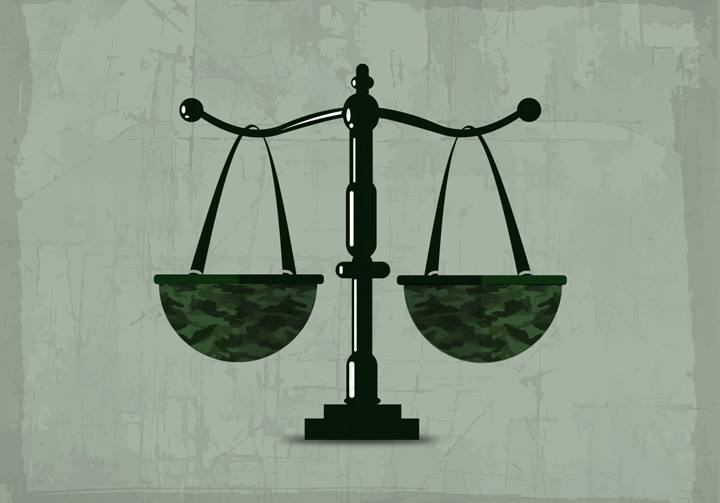ISLAMABAD:
The Supreme Court’s seven-member constitutional court, headed by Justice Aminuddin Khan, on Thursday raised questions about the decision-making process of the military courts as it sought details of the civilians so far convicted in these courts.
During the hearing of the internal appeal of the Supreme Court’s decision on the military trial against civilians, the judges said that the court wanted to see the procedure and whether the requirements for a transparent trial were met in the military court.
Defense Ministry lawyer Khawaja Haris continued his arguments. He said the procedure was followed in military trials. On this, Judge Hassan Rizvi noted that the court had asked for records of military trials because the court wanted to see how the decision on evidence was made in the trial.
Justice Muhammad Ali Mazhar noted that the court also wanted to see the procedure and whether the requirements for a transparent trial were met in the military court. Haris said that neither the high courts nor the Supreme Court could review the case.
He added that the court would be shown the record of a case for review. Judge Rizvi said the court should not discuss the evidence in the trial, but stressed that under the natural justice system, no one could be convicted without being heard.
Haris said five Supreme Court justices who ruled against the military trial against civilians did not properly assess the issue of admissibility. He added that the court could not even review the merits of the case.
Judge Jamal Mandokhail asked if the law on military trials against civilians could be amended. Justice Muhammad Ali Mazhar observed that the constitutional article on due process came in 2010 while the Code of Criminal Procedure (CrPC) came in 1898 which had provided the full procedure for a trial.
Justice Mandokhail raised the question as to what was the purpose of enacting the Army Act. Haris said the purpose of the Army Act was to ensure that there was no hindrance in the activities of the armed forces. He added that the process of improving the law continued.
Justice Naeem Afghan noted that the Army Act dealt with the officers and soldiers of the armed forces, but its Section 2 was amended in 1967 and the words “any person” were added to it, after which retired officers also came under military trial. .
He noted that if this Section 2 remained invalid, a military trial against any retired officer would not be possible, adding that if a retired person was under a military trial, it would also end. He said that even after the introduction of Article 10A in the Constitution, there was talk in the courts of due process.
Khawaja Haris said the constitutional amendment was passed for other reasons. Justice Mandokhail asked the Defense Ministry counsel to try to complete his arguments on Friday (today). The hearing was later adjourned.
Separately, a three-member bench of the Supreme Court adjourned the hearing of a case related to Article 191A.
Heading the bench, Justice Mansoor Ali Shah said the case had not been resolved before the same regular bench which heard the case on January 13.



